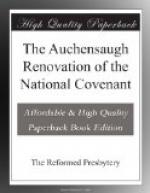Sermon being closed by prayer, the Acknowledgment of Sins was again read, as preparative to the engaging part; and the minister, in the first place, admonished all such as were guilty of such public steps of defection as are confessed in the Acknowledgment, to make full and free confession thereof before the congregation, with such a due sense of, and sorrow for these public sins, as might evidence a hearty design of abandoning them and of adhering more closely to covenanted duties, which accordingly many did, both with respect to the perjurious oaths of the late times and defections of the present.
Because many have made a handle of this, above any other part of the action, to reproach and render the whole of the work contemptible, calling it Jesuitic superstition, enthusiasm, advancing our own confessions into the room of Christ’s satisfaction, and expecting pardon upon the score of superficial public acknowledgments:—therefore, to vindicate this part of the work from such groundless calumny, we desire it may be adverted. 1st, That this is a commanded duty, that such as have violated the law and commandments of God, and being guilty of false and unfaithful dealing in his covenant, should unfeignedly confess their iniquity, which, if they do, God is faithful and just to forgive. 2d, That according to the nature of the offence, as the same has been acted secretly or publickly, and is of a secret or public nature and concern, so it ought to be confessed. If the offence be in its nature and way of perpetration a secret sin, known only to God and the person’s own conscience, secret repentance sufficeth: nor can the church require any thing else, in regard such sins come not within the sphere of her cognizance;—but if the sin be public and national, or only personal, but publickly acted, so as the same has been stumbling, scandalous, and offensive to others; then it is requisite, for the glory of God and good of offended brethren, that the acknowledgment be equally public as the offence. These are first principles that will not need to be proved, but may be taken for granted. But, 3dly, To make it appear that it is consonant to the practice of the godly to make public confession of national backsliding, we will advance two or three Scripture instances. Joshua, chap. vii. 19, compared with verse 11, commands Achan, who had broken God’s covenant which he commanded Israel, and so brought upon the whole nation the Lord’s anger, that he would give glory to God, by making confession to him. Whence it appears, that such sins as are national in their consequences, and bring national judgments upon a people, ought to be publickly confessed for turning away these judgments, and vindicating the honour of the Supreme Lawgiver, Ezra x. 1,2—“Now when Ezra had prayed, and when he had confessed, weeping, and casting himself down before the house of God, there assembled unto him out of Israel a very great congregation of men, women, and children: for




